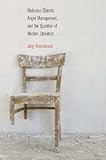Malicious Objects, Anger Management, and the Question of Modern Literature / Jörg Kreienbrock.
Material type: TextPublisher: New York, NY : Fordham University Press, [2012]Copyright date: ©2012Description: 1 online resource (328 p.)Content type:
TextPublisher: New York, NY : Fordham University Press, [2012]Copyright date: ©2012Description: 1 online resource (328 p.)Content type: - 9780823245284
- 9780823245314
- 809/.93353 23
- online - DeGruyter
| Item type | Current library | Call number | URL | Status | Notes | Barcode | |
|---|---|---|---|---|---|---|---|
 eBook
eBook
|
Biblioteca "Angelicum" Pont. Univ. S.Tommaso d'Aquino Nuvola online | online - DeGruyter (Browse shelf(Opens below)) | Online access | Not for loan (Accesso limitato) | Accesso per gli utenti autorizzati / Access for authorized users | (dgr)9780823245314 |
Browsing Biblioteca "Angelicum" Pont. Univ. S.Tommaso d'Aquino shelves, Shelving location: Nuvola online Close shelf browser (Hides shelf browser)

|

|

|

|

|

|

|
||
| online - DeGruyter Standing by the Ruins : Elegiac Humanism in Wartime and Postwar Lebanon / | online - DeGruyter Rethinking Media Pluralism / | online - DeGruyter Untouchable Fictions : Literary Realism and the Crisis of Caste / | online - DeGruyter Malicious Objects, Anger Management, and the Question of Modern Literature / | online - DeGruyter Marginal Modernity : The Aesthetics of Dependency from Kierkegaard to Joyce / | online - DeGruyter Constellation : Friedrich Nietzsche and Walter Benjamin in the Now-Time of History / | online - DeGruyter The Sense of Semblance : Philosophical Analyses of Holocaust Art / |
Frontmatter -- Contents -- Acknowledgments -- Introduction -- 1. “When Things Move upon Bad Hinges” -- 2. Annoying Bagatelles -- 3. Malicious Objects -- 4. Igniting Anger -- Epilogue -- Notes -- Bibliography -- Index
restricted access online access with authorization star
http://purl.org/coar/access_right/c_16ec
Why do humans get angry with objects? Why is it that a malfunctioning computer, a broken tool, or a fallen glass causes an outbreak of fury? How is it possible to speak of an inanimate object’s recalcitrance, obstinacy, or even malice? When things assume a will of their own and seem to act out against human desires and wishes rather than disappear into automatic, unconscious functionality, the breakdown is experienced not as something neutral but affectively—as rage or as outbursts of laughter. Such emotions are always psychosocial: public, rhetorically performed, and therefore irreducible to a “private” feeling.By investigating the minutest details of life among dysfunctional household items through the discourses of philosophy and science, as well as in literary works by Laurence Sterne, Jean Paul, Friedrich Theodor Vischer, and Heimito von Doderer, Kreienbrock reconsiders the modern bourgeois poetics that render things the way we know and suffer them.
Mode of access: Internet via World Wide Web.
In English.
Description based on online resource; title from PDF title page (publisher's Web site, viewed 03. Jan 2023)


